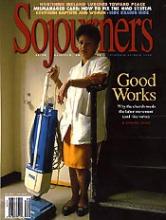At recent nursing-home-worker rallies in Minneapolis, collar-wearing clergy walk among placard-carrying workers and slogan- shouting organizers. And that is just where they should be, according to some Twin Cities area religious leaders who believe that economic justice and the rights of workers are cutting-edge religious issues.
"Religion and labor together creates a kind of synergy," says Stephen Van Kuiken, pastor of the Presbyterian Church of the Apostles in Burnsville, Minnesota. "I'm excited about the coalitions that are developing, and that we are seeing the natural connections between religion and labor. We are both justice-minded people." Mary Rosenthal, field director of the Minnesota AFL-CIO, agrees. "There is a growing awareness and appreciation for the links and overlaps between religion and labor," she says.
Van Kuiken, Rosenthal, and other local clergy and labor leaders are at the forefront of expanding partnerships between religion and organized labor in the Twin Cities area. Two years ago, in November 1996, the first religion-labor coalition in recent memory was founded.
The Religious Alliance for a Just Global Economy (RAJGE) quickly became active in local labor issues, especially in developing religious support for organizing efforts of nursing home workers in Minneapolis. When workers at the Nile nursing home faced managerial opposition, for example, clergy attended rallies and 10 ministers signed a letter outlining rules of conduct for employers whose workers are organizing a union. Nile management is currently negotiating with Service Employees International Union Local 113.
Van Kuiken, a co-founder of RAJGE, says that his motivation to get involved came out of his faith-based commitment to justice. "I am concerned about fair labor and economic justice because of what I read in the Bible," he said.
Read the Full Article
